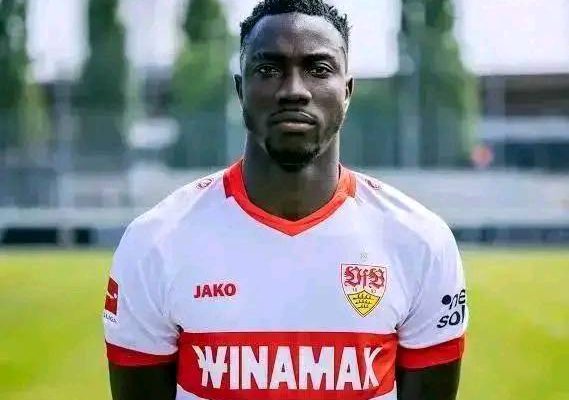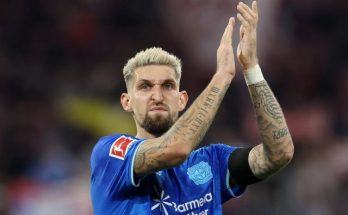In Stuttgart, a tremor has shaken not only the city but the entire Bundesliga landscape. A mega earthquake, not one born from the ground but from the football pitch, as head coach Sebastian Hoeneß and the VfB Stuttgart leadership are preparing a future offensive of historic proportions. While many clubs in Germany and across Europe fear the constant exodus of their stars to wealthier leagues and bigger names, VfB Stuttgart is making a bold stand. They want to keep their core, reward their key performers, and build something sustainable that could lead them into a new era of stability and ambition. The names at the center of this plan are Alexander Nübel, Josha Vagnoman, Silas Katompa Mvumpa, and Pascal Stenzel. Four players who not only embody quality but also the identity and fighting spirit of this team. Talks are in full swing, and the message is clear: Stuttgart is no longer just a stepping-stone, but a club where careers can thrive and legacies can be written.
Alexander Nübel, the goalkeeper who returned to the Bundesliga after his loan spell in Monaco, has shown the maturity and presence between the posts that Stuttgart has longed for. His performances have instilled confidence in the defense and have often been the difference in tight matches. Nübel represents more than just saves—he symbolizes reliability and leadership, qualities that Stuttgart desperately wants to secure for the long haul. With his experience and age profile, he could serve as the foundation for a team built to challenge consistently in the Bundesliga’s upper half. The negotiations with him are not just about extending a contract; they are about making a statement to the rest of the league: Stuttgart intends to compete with the best by holding onto players who could easily be lured by Bayern Munich, Borussia Dortmund, or even Premier League clubs.
Josha Vagnoman, meanwhile, is the type of versatile defender every successful team craves. Quick, strong in duels, and reliable in both defensive and attacking phases, he has established himself as a player capable of playing multiple positions across the backline. Still young but already with significant Bundesliga experience, he is one of the faces of Stuttgart’s modern football. His renewal would not just please fans who see him as a rising star but would also secure a player whose value could skyrocket in coming years. For Hoeneß, retaining Vagnoman is crucial because stability in the defensive line is what allows creativity and risk-taking in attack. By securing him, Stuttgart would be safeguarding one of its most valuable assets while also maintaining balance in a squad that mixes youth with experience.
Then there is Silas, the electrifying winger whose pace, flair, and unpredictability have made him a fan favorite and a nightmare for defenders. Few players in the Bundesliga can match his explosiveness and ability to change a game in an instant. Silas embodies the modern attacking spirit—fearless, daring, and capable of producing moments that live long in memory. His journey at Stuttgart has not always been easy; injuries and setbacks threatened his rise, but he has always returned with determination. Now, as he enters his prime years, the club wants to make sure he writes his story in Stuttgart colors. His extension would be more than a contract; it would be a love letter to the fans who have cheered him on during both highs and lows. For Hoeneß, Silas is the type of weapon that can turn Stuttgart into a genuine contender not only domestically but also on the European stage if the club secures continental football in the coming years.
Pascal Stenzel, often underrated by those outside Stuttgart, represents the glue that keeps the squad together. Not always the flashiest player, but one of the most dependable and hardworking, he has been a pillar of professionalism and dedication. His ability to step in across defensive roles, his experience, and his leadership in the dressing room are qualities that often go unnoticed but are invaluable to a team’s long-term stability. Extending Stenzel’s stay is as much about maintaining culture and leadership within the squad as it is about footballing ability. He provides the steadying hand, the calm head in turbulent moments, and ensures that the younger talents have a role model to follow.
The negotiations with these four players symbolize a new chapter for Stuttgart. In the past, the club has often been forced to sell its best talents, sometimes at the peak of their careers. Fans still remember watching stars depart to Bayern, Dortmund, or abroad, leaving them to rebuild once more. But Hoeneß and the current management appear determined to break that cycle. By working towards long-term agreements with these cornerstones, they are sending a signal not just to the supporters but to the league: VfB Stuttgart wants to play a bigger role in German football again.
The timing could not be better. Stuttgart has shown signs of resurgence in recent seasons, building on strong tactical foundations and a passionate fan base that fills the Mercedes-Benz Arena with energy every week. The atmosphere surrounding the club is one of cautious optimism, and tying down these players would transform that optimism into genuine belief. The fans have always been the heartbeat of VfB, and this move to secure their favorites will only deepen the bond between club and supporters.
From a strategic perspective, this move also has long-term financial implications. The Bundesliga has often been criticized for being too much of a selling league, with its stars heading to the Premier League or Spain once they prove themselves. Stuttgart refusing to bow to that trend would not only raise their profile but also increase their attractiveness to other talents who might see the club as a destination rather than a stepping-stone. Retaining Nübel, Vagnoman, Silas, and Stenzel means that Stuttgart can build a squad that grows together, develops chemistry, and aims for trophies rather than constantly having to start over.
Hoeneß’s role in this cannot be understated. Since his arrival, he has not only brought stability and tactical clarity but also fostered a sense of unity and belief within the team. His relationship with the players, his ability to convince them of the project’s vision, and his reputation in German football all play a part in persuading these stars to commit their futures to Stuttgart. The players trust him, the fans respect him, and the management has given him the backing he needs. This alignment of coach, players, and leadership is rare in football, and Stuttgart seems to be in a golden moment to capitalize on it.
Of course, negotiations in football are never straightforward. Salaries, contract lengths, release clauses, and ambitions all come into play. Nübel, for instance, knows that top clubs are watching him closely. Silas has suitors abroad who could tempt him with higher wages. Vagnoman is on the radar of Germany’s elite, and Stenzel, despite his loyalty, also has options. But the fact that talks are ongoing and progressing positively shows that there is genuine will on both sides. Stuttgart is ready to reward loyalty with competitive salaries and the promise of building something meaningful.
For the fans, the mere idea of these four staying on long-term is electrifying. The Mercedes-Benz Arena thrives on emotional connection, and nothing fuels that bond more than the belief that their heroes are committed to the badge. It turns every cheer louder, every chant more passionate, and every victory sweeter. Imagine the roar when Silas signs his extension, when Nübel commits his future, when Vagnoman declares he’s staying, when Stenzel’s professionalism is rewarded—these would be moments etched into the club’s modern history.
Looking ahead, the implications of these deals could stretch far beyond Stuttgart’s walls. In a Bundesliga landscape increasingly dominated by Bayern Munich and Borussia Dortmund, Stuttgart could position itself as the next challenger, much like RB Leipzig has done in recent years. With a core of players secured and a visionary coach in Hoeneß, they could consistently push for European qualification and perhaps even dream of silverware. The balance of power in German football could slowly begin to shift if more clubs take this stance of retention and ambition.
The metaphorical earthquake in Stuttgart is not about destruction but about shaking up the status quo. It is about shaking off the label of being a stepping-stone club, about shaking the league into recognizing VfB as a force once again, about shaking the fans into a frenzy of belief that their club is destined for something greater. The ground may not literally tremble, but the reverberations of these moves will be felt across the Bundesliga.
At the end of the day, football is as much about dreams as it is about tactics and finances. And in Stuttgart, a dream is taking shape: a dream of a team that grows together, fights together, and stays together. Nübel commanding the box, Vagnoman patrolling the backline, Silas dazzling on the wings, and Stenzel holding everything steady—this is the vision that Sebastian Hoeneß and VfB Stuttgart are chasing. If the negotiations succeed, the fans won’t just be celebrating contract extensions; they’ll be celebrating the dawn of a new era.



